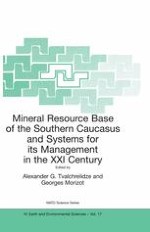The NATO Advanced Research Workshop “Mineral Resource Base of the Southern Caucasus and Systems for its Management in the XXI Century” was held in Tbilisi on April 3-6, 2001. The workshop was financed by the NATO Science Programme and financially supported by the Open Society – Georgia Foundation. By the end of the XX century the new states of the Southern Caucasus (Azerbaijan, Armenia and Georgia) found themselves in the lowest phase of a severe structural crisis. Belonging to the same geopolitical space and having the common economic history during the XIX and XX centuries, these countries will be able to overcome this crisis and to integrate into the world community only step-by-step, exploiting their resource bases and developing competitive branches of industries. Moreover, in our opinion, such conception is the only alternative to the spontaneous economical chaos. Solution of this problem seems to be impossible without close international collaboration. From this point of view, the idea of regional alliances where regional actors would be linked by a general, non-contradictory macroeconomic model seems to be the only possibility for sustainable development. Creation of The Southern Caucasus Alliance (SCA) where Georgia, Azerbaijan, Armenia and Turkey would find their place could be possible only in case if the economic reality and economic interests would weigh down nationalistic doctrines of political isolationism.
